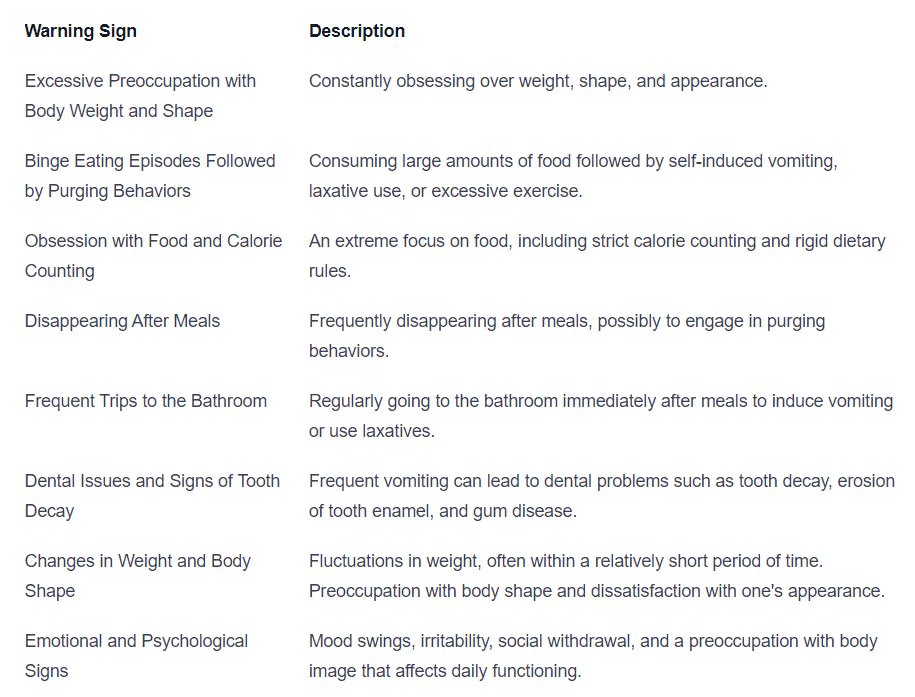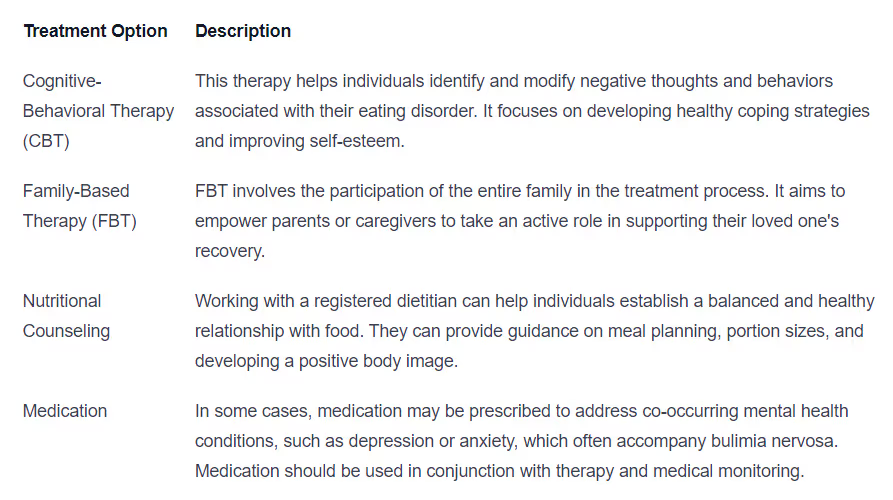8 Warning Signs of Bulimia Nervosa

Understanding Bulimia Nervosa
Bulimia nervosa is a serious eating disorder that affects individuals of all genders and ages. It is characterized by a cycle of binge eating followed by compensatory behaviors such as self-induced vomiting, excessive exercise, or the misuse of laxatives. Recognizing the warning signs of bulimia nervosa is crucial for early intervention and support.
What is Bulimia Nervosa?
Bulimia nervosa is an eating disorder that involves recurrent episodes of binge eating, which are characterized by consuming large amounts of food within a short period of time and feeling a loss of control during these episodes. These episodes are then followed by compensatory behaviors, such as self-induced vomiting, fasting, or excessive exercise, in an attempt to prevent weight gain.
Individuals with bulimia nervosa often have a distorted body image and place an excessive emphasis on body weight and shape. They may have intense feelings of guilt, shame, and self-disgust after a binge episode, which contributes to the cycle of bingeing and purging.
The Importance of Identifying Warning Signs
Identifying the warning signs of bulimia nervosa is crucial for early intervention and support. While the presence of one or more of these signs does not necessarily indicate the presence of bulimia nervosa, they serve as important red flags that should not be ignored. Early recognition and intervention can lead to more successful treatment outcomes and prevent further physical and psychological harm.

Recognizing these warning signs and seeking help from healthcare professionals is crucial for individuals with bulimia nervosa. With early intervention, appropriate treatment, and a strong support system, individuals can begin the journey towards recovery and reclaiming a healthy relationship with food and their bodies.
Warning Signs of Bulimia Nervosa
Bulimia nervosa is a serious eating disorder that can have detrimental effects on both physical and mental health. Recognizing the warning signs is crucial for early intervention and treatment. Here are eight warning signs of bulimia nervosa to be aware of:
Excessive Preoccupation with Body Weight and Shape
Individuals with bulimia nervosa often exhibit an intense preoccupation with their body weight and shape. They may constantly talk about their weight, express dissatisfaction with their appearance, or engage in frequent body-checking behaviors. This preoccupation becomes a dominant focus in their life, leading to distress and a negative self-image.
Binge Eating Episodes Followed by Purging Behaviors
One of the hallmark signs of bulimia nervosa is the occurrence of binge eating episodes followed by purging behaviors. During a binge, individuals consume an unusually large amount of food within a discrete period, feeling a lack of control over their eating. Following a binge, they may resort to purging methods such as self-induced vomiting, laxative or diuretic abuse, or excessive exercise to compensate for the consumed calories.
Obsession with Food and Calorie Counting
Those with bulimia nervosa often develop an obsession with food and calorie counting. They may meticulously track their food intake, read food labels excessively, or maintain strict dietary rules. This obsession can become all-consuming and lead to rigid eating patterns and severe restrictions.
Disappearing After Meals
Individuals with bulimia nervosa may frequently disappear after meals, especially to engage in purging behaviors. They may find excuses to go to the restroom immediately after eating or isolate themselves for extended periods to hide their purging behaviors.
Frequent Trips to the Bathroom
Frequent trips to the bathroom are a common warning sign of bulimia nervosa. This is often associated with purging behaviors, as individuals may induce vomiting or use laxatives or diuretics to eliminate the consumed food. This behavior is usually done secretly to avoid detection.
Dental Issues and Signs of Tooth Decay
The repeated exposure of tooth enamel to stomach acid during purging can lead to dental issues and signs of tooth decay. Individuals with bulimia nervosa may experience tooth sensitivity, enamel erosion, cavities, and gum problems. These dental problems can serve as a visible indicator of the disorder.
Changes in Weight and Body Shape
Fluctuations in weight and body shape are commonly observed in individuals with bulimia nervosa. They may go through cycles of weight loss and gain due to the binge-purge pattern. However, it's important to note that not all individuals with bulimia nervosa exhibit significant weight changes, as some may maintain a relatively stable weight.
Emotional and Psychological Signs
In addition to the physical signs, there are emotional and psychological manifestations of bulimia nervosa. These can include mood swings, irritability, anxiety, depression, feelings of guilt or shame related to eating behaviors, low self-esteem, and social withdrawal. Individuals with bulimia nervosa may also experience a distorted body image, perceiving themselves as overweight even when they are underweight or within a healthy weight range.
Recognizing these warning signs is crucial for early intervention and seeking professional help. If you or someone you know is exhibiting these signs, it's important to reach out to a healthcare professional or a helpline specializing in eating disorders to get the support and treatment needed.
Seeking Help and Support
Recognizing the warning signs of bulimia nervosa is an important step, but seeking help and support is equally crucial for individuals who may be affected by this eating disorder. Healthcare professionals play a key role in the diagnosis, treatment, and support of individuals with bulimia nervosa. Additionally, there are various treatment options and supportive resources available to help those affected and their loved ones.
The Role of Healthcare Professionals
Healthcare professionals, such as doctors, psychologists, and dietitians, play a vital role in the identification, assessment, and treatment of bulimia nervosa. If you or someone you know is displaying warning signs of this eating disorder, it is important to seek help from these professionals. They can provide a comprehensive evaluation, diagnose the condition, and develop an individualized treatment plan.
Healthcare professionals can also monitor the physical and mental health of individuals with bulimia nervosa, and provide ongoing support throughout the recovery process. They may use a multidisciplinary approach, collaborating with other specialists to address the medical, psychological, and nutritional aspects of the disorder.
Treatment Options for Bulimia Nervosa
There are several treatment options available for individuals with bulimia nervosa. The most effective approach often involves a combination of therapies tailored to the individual's needs. Some common treatment options for bulimia nervosa include:

It's important to note that treatment plans should be individualized and may vary depending on the severity and specific needs of the individual. Consulting with healthcare professionals is crucial to determine the most appropriate treatment approach.
Supportive Resources for Individuals and Loved Ones
Apart from professional help, there are various supportive resources available for individuals with bulimia nervosa and their loved ones. These resources can provide additional guidance, information, and emotional support throughout the recovery journey. Some examples of supportive resources include:
- Support groups: Joining a support group, either in-person or online, can connect individuals with others who are going through similar experiences. Sharing stories, challenges, and triumphs can provide a sense of understanding and encouragement.
- Helplines and hotlines: Helplines and hotlines staffed by trained professionals can offer immediate support, guidance, and crisis intervention for individuals in need. These services are anonymous and available 24/7.
- Online forums and communities: Online forums and communities dedicated to eating disorder recovery provide a platform for individuals to connect, seek advice, and share valuable resources. These platforms can serve as a source of inspiration and encouragement.
Remember, seeking help and support is an important step towards recovery. Whether it's reaching out to healthcare professionals, exploring treatment options, or accessing supportive resources, know that you don't have to face bulimia nervosa alone.
Conclusion
Bulimia nervosa is a serious eating disorder that can have detrimental effects on both physical and mental health. Recognizing the warning signs is crucial for early intervention and treatment. Seeking help from healthcare professionals, exploring treatment options, and accessing supportive resources are important steps towards recovery. With the right support system in place, individuals with bulimia nervosa can begin to heal their relationship with food and their bodies.Remember, recovery is possible, and seeking help is a sign of strength. Let's continue to raise awareness about this disorder and work towards a world where everyone has access to the resources they need to lead happy, healthy lives.
